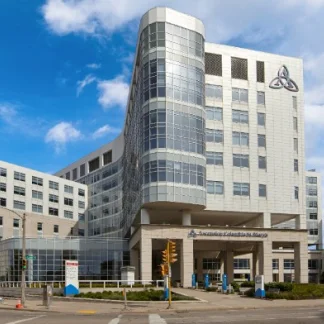American Indian Council on Alcoholism
American Indian Council on Alcoholism offers outpatient treatment for individual...
Columbia St. Mary’s Hospital Milwaukee is a reputable behavioral health treatment center in Milwaukee, WI. The center offers programs to address complications linked to mental illness, including drug and alcohol addiction, family conflicts, and social isolation.
Columbia St. Mary’s Hospital Milwaukee works to provide tailored treatment services that include the following:
Columbia St. Mary’s Hospital Milwaukee utilizes Suboxone treatment to address substance use disorders and assist in withdrawal management. The treatment provides follow up care to monitor for relapse and provide substance use counseling.
The facility offers an intensive inpatient treatment program, providing continuous supervision and support for those with severe addiction issues. The treatment program addresses various types of substance use disorders and co-occurring mental health conditions.
Columbia St. Mary’s Hospital Milwaukee also provides a specialized program for adolescents. This program focuses on the unique challenges and needs of teenagers dealing with substance use disorders.
The center provides behavioral health counseling services, catering to both individuals and families. This holistic approach addresses the wider impact of substance use on family dynamics and relationships.
The partial hospitalization program (PHP) at Columbia St. Mary’s Hospital Milwaukee offers structured outpatient care, allowing patients to receive intensive treatment while living at home. This program is designed for individuals who need more support than typical outpatient services but do not require full inpatient care.
To ensure long-term recovery and prevent relapse, Ascension Wisconsin offers case management and continuing care services. These services provide ongoing support and resources to help individuals maintain their sobriety and continue their recovery journey after completing more intensive treatment phases.
Contact us for more information: (262) 243-7388

Connect with Columbia St. Mary's Hospital Milwaukee by calling their admissions team directly.
(262) 243-7388 Website Get DirectionsThe Joint Commission, formerly known as JCAHO, is a nonprofit organization that accredits rehab organizations and programs. Founded in 1951, the Joint Commision's mission is to improve the quality of patient care and demonstrating the quality of patient care.
Joint Commission Accreditation: Yes
ECT is a form of treatment in which controlled electric currents are passed through the brain, sometimes causing short seizures. Treatments are done under general anesthesia. ECT appears to change brain chemistry for the better, and has been shown to provide fast and sometimes dramatic improvements in severe mental health conditions that can exist alongside addiction, including depression, bipolar disorder, psychosis, and suicidality. ECT is also often used by those who prefer it to taking medication.
Group therapy is any therapeutic work that happens in a group (not one-on-one). There are a number of different group therapy modalities, including support groups, experiential therapy, psycho-education, and more. Group therapy involves treatment as well as processing interaction between group members.
In individual therapy, a patient meets one-on-one with a trained psychologist or counselor. Therapy is a pivotal part of effective substance abuse treatment, as it often covers root causes of addiction, including challenges faced by the patient in their social, family, and work/school life.
Group therapy is any therapeutic work that happens in a group (not one-on-one). There are a number of different group therapy modalities, including support groups, experiential therapy, psycho-education, and more. Group therapy involves treatment as well as processing interaction between group members.
In individual therapy, a patient meets one-on-one with a trained psychologist or counselor. Therapy is a pivotal part of effective substance abuse treatment, as it often covers root causes of addiction, including challenges faced by the patient in their social, family, and work/school life.
In individual therapy, a patient meets one-on-one with a trained psychologist or counselor. Therapy is a pivotal part of effective substance abuse treatment, as it often covers root causes of addiction, including challenges faced by the patient in their social, family, and work/school life.
American Indian Council on Alcoholism offers outpatient treatment for individual...
Omni Enrichment is a private rehab located in Milwaukee, Wisconsin. Omni Enrichm...
Clement J. Zablocki VA Medical Center provides Behavioral Health and Chemical De...
Crack Treatment Recovery First is a private rehab located in Milwaukee, Wisconsi...